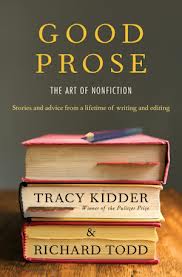Book Review: Good Prose – The Art of Non Fiction
 I gave a talk at WordCamp Seattle recently about writing. One point I made was the limitations for improving writing skills merely by listening or reading. For the same reasons reading about playing guitar or juggling knives is insufficient to learn how to be a great guitar player or fully limbed knife juggler, mere reading is consumption, not practice. Skill development only comes from practice. Over the years I’ve read many books on writing anyway, they do help more if you are practicing the craft, but rarely read any of them now.
I gave a talk at WordCamp Seattle recently about writing. One point I made was the limitations for improving writing skills merely by listening or reading. For the same reasons reading about playing guitar or juggling knives is insufficient to learn how to be a great guitar player or fully limbed knife juggler, mere reading is consumption, not practice. Skill development only comes from practice. Over the years I’ve read many books on writing anyway, they do help more if you are practicing the craft, but rarely read any of them now.
This one, Good Prose, however I had to read. Tracy Kidder is a pioneer of modern narrative writing, especially about technology and entrepreneurship, for his Pulitzer prize winning book Soul of A New Machine. I read it in college as many in my generation did, and it planted seeds for how to write and think about many things. When I heard he’d published a book about writing in collaboration with his long time editor Richard Todd, I had to check it out. And as time would have it, I was working on revising the Year Without Pants just when it came out. The timing could not have been more better.
[Actual review begins here]
Good Prose: The Art of Nonfiction is unusual for its lack of pretense about why you are reading it. It’s not a manual and it’s not a lesson. It’s two masters who have been studying and practicing the craft of journalistic narratives for decades attempting to document what they do and what they know. The essays in the book wind around deep subjects like narrative, honesty, structure and style, frequently referencing stories from Kidder’s book projects as examples for challenges faced and overcome.
Most of Kidder’s work is reportage, long form journalism and the book follows that line. What’s notable for all writers are the hints and nods the book makes to the fact that all writing has a narrative, and all writing is reporting. Even if you blog about your adventures in the kitchen, or post short summaries of your day on Facebook, you are engaging with many of the challenges Kidder and Todd explore in the book.
The biggest surprise for me as an author was how long Kidder’s writing projects take. Research is often years and he explains 8 or 10 complete drafts are not uncommon. As a fan of his work these facts are a reminder there are no shortcuts. Better writing is the result of more work and commitment.
The payoffs for the book are greater for people who write deeply, books and longer narratives, but anyone interested in writing craft will find this book a pleasure. It helps if you’re familiar with Kidder’s work, but that’s far from a requirement.
Here are some choice quotes from Good Prose:
No other art form is so infinitely mutable. Writing is revision. All prose responds to work.
For instance, one sure way to lose the reader is trying to get down everything you know about a person. What the imaginative reader wants is telling details.
Writers want to be engaging, and it is easy to try to purchase charm at the expense of honesty, but the ultimate charm lies in getting the face more right than pretty
Every journalist who is not too stupid or too full of himself to notice what is going on knows that what he does is morally indefensible. He is a kind of confidence man, preying on people’s vanity, ignorance, or loneliness, gaining their trust and betraying them without remorse. Like the credulous widow who wakes up one day to find the charming young man and all her savings gone, so the consenting subject of a piece of nonfiction writing learns—when the book or article appears—his hard lesson. Journalists justify their treachery in various ways according to their temperaments. The more pompous talk about freedom of speech and “the public’s right to know”; the least talented talk about Art; the seemliest murmur about earning a living.
Much overstuffed prose reflects a desire to bully, to impress, or to hide.
It has taken, on average, about three years for me to research and write a book, long enough for each to seem like an occupation in itself.
Every piece of writing, even classic works, can be ridiculed.
Whatever art any book achieves may or may not be rewarded in the marketplace, but art isn’t generally achieved with the market in mind. Every book has to be in part its own reward. In happy moments one realizes that the best work is done when one’s eye is simply on the work, not on its consequences, or on oneself. It is something done for its own sake. It is, in Lewis Hyde’s term, a gift.
I always wince when a reviewer says, “This book needed an editor.” Often it had an editor, but the writer prevailed.

“it is easy to try to purchase charm at the expense of honesty”
AKA Jonah Lehrer.
Thanks for the review, I will have to check this book out. I’m quite happy to see that Kidder is not a fan of the phrase “going forward” either!